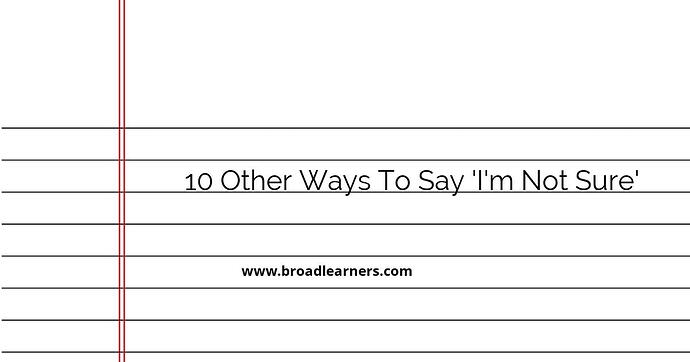When you're uncertain about something, it's common to say 'I'm not sure.' However, there are several alternative phrases you can use to express your uncertainty in a different way. Here are 10 other ways to say 'I'm not sure':
- I'm uncertain
- I'm unsure
- I don't know
- I'm not certain
- I'm not confident
- I'm not convinced
- I'm not entirely sure
- I'm not completely certain
- I'm not entirely convinced
- I can't say for sure
Let's explore each alternative phrase with examples:
1. I'm Uncertain
This phrase is a formal way to express doubt or lack of confidence in your knowledge or opinion. It is often used in professional settings or when discussing complex topics.
Example: 'I'm uncertain about the outcome of the experiment. There are still many variables we haven't considered.'
2. I'm Unsure
'I'm unsure' is a more casual way to convey your lack of certainty. It is commonly used in everyday conversations and informal settings.
Example: 'I'm unsure if I'll be able to attend the meeting tomorrow. I have a conflicting appointment.'
3. I Don't Know
'I don't know' is a straightforward and direct way to express that you lack knowledge or information about a particular topic.
Example: 'I don't know the answer to that question. Can you provide more context?'
4. I'm Not Certain
'I'm not certain' is similar to 'I'm not sure,' but it emphasizes the lack of confidence or assurance in your statement.
Example: 'I'm not certain if we should proceed with this plan. We need more data to make an informed decision.'
5. I'm Not Confident
This phrase indicates that you lack confidence in your understanding or ability to make a judgment.
Example: 'I'm not confident in my ability to solve this problem. I may need assistance.'
6. I'm Not Convinced
If you're not convinced, it means you're not persuaded or fully convinced about a particular idea, argument, or proposal.
Example: 'I'm not convinced that this marketing strategy will yield the desired results. We should consider other options.'
7. I'm Not Entirely Sure
'I'm not entirely sure' implies that you have some doubts or reservations about a statement or decision.
Example: 'I'm not entirely sure if this is the right approach. We should gather more information before making a final decision.'
8. I'm Not Completely Certain
'I'm not completely certain' conveys a similar meaning to 'I'm not entirely sure.' It suggests a degree of uncertainty or lack of full confidence.
Example: 'I'm not completely certain if this investment will yield the expected returns. We should conduct a thorough analysis.'
9. I'm Not Entirely Convinced
This phrase indicates that you have some doubts or reservations about a belief, argument, or proposal.
Example: 'I'm not entirely convinced that reducing the team's budget will lead to better outcomes. We should consider other factors.'
10. I Can't Say for Sure
'I can't say for sure' implies that you lack the necessary information or certainty to provide a definite answer or opinion.
Example: 'I can't say for sure if the project will be completed by the deadline. There are still some unresolved issues.'
By using these alternative phrases, you can communicate your uncertainty or lack of knowledge in a more varied and nuanced way. Consider the context and tone of the conversation to choose the most appropriate alternative.
Did I miss anything? Respond below
